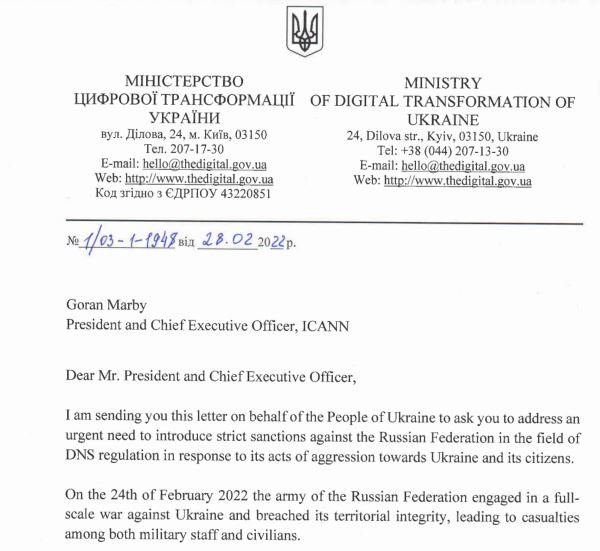Mykhailo Fedorov, Deputy Prime Minister of Ukraine, has asked the heads of the Internet Corporation for Assigned Names and Numbers (ICANN) to disable top-level domains with country codes associated with Russia. Fedorov wrote an email to Göran Marby, CEO of ICANN, requesting the imposition of this sanction due to the Russian military invasion of Ukraine, ordered by President Vladimir Putin.
Specifically, the Ukrainian government requested the revocation of the domains “.ru”, “.рф”, “.su”, among others used by the Russian Federation. In this way, Ukraine hopes that the DNS root servers serving Russia will be shut down and the TLS/SSL certificates associated with those domains can be revoked.

Fedorov believes that this will put limits on what he defined as Kremlin-funded disinformation campaigns and platforms: “Governments and organizations around the world are in favor of introducing sanctions against the Russian Federation… I kindly ask you to consider such measures and implement them as soon as possible.”
If this decision is approved, some 5 million global Internet domains would be blocked, significantly impacting Russia’s online communications.
The message has already generated reactions. Erich Schweighofer, a professor at the University of Vienna and a member of ICANN, said: “ICANN is a neutral platform, which does not take a position on this conflict but allows states to act accordingly, allowing blocking all traffic from a particular state, for example.”
The Regional Internet Registry (RIR) for Europe, the Middle East and parts of Central Asia, responsible for the allocation of Internet resources, rejected Fedorov’s request: “It is crucial that RIP remains neutral and does not take positions regarding internal political disputes, international conflicts or wars,” said RIR Executive Board Chairman Christian Kaufmann.
ICANN has not formally responded to this request.
In addition to condemnation from the international community, some tech companies have taken sides in favor of Ukraine. Domain registration firm Namecheap, for example, recommended its clients in Russia to start negotiating with other domain registrars: “Due to the war crimes and human rights violations of the Russian regime in Ukraine, we will no longer provide services to users registered in Russia,” the company confirmed via email.
To learn more about information security risks, malware variants, vulnerabilities and information technologies, feel free to access the International Institute of Cyber Security (IICS) websites.
He is a cyber security and malware researcher. He studied Computer Science and started working as a cyber security analyst in 2006. He is actively working as an cyber security investigator. He also worked for different security companies. His everyday job includes researching about new cyber security incidents. Also he has deep level of knowledge in enterprise security implementation.
